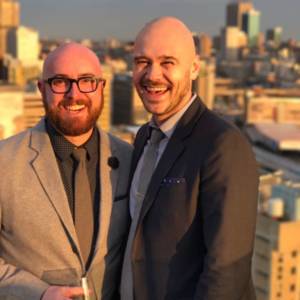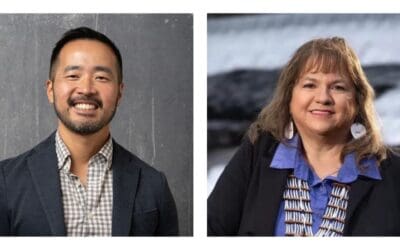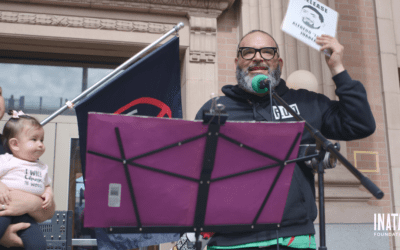Until Feb. 1, 2023, we were Group Health Foundation. This post was written under our former identity. To learn more about our new name, read our announcement here.

A rainbow over Snoqualmie Falls. Photo: Steven Cole-Schwartz
When white-led organizations misidentify who they are, it perpetuates inequities
At Group Health Foundation, we do something that makes some of our grant applicants uncomfortable: When we ask for the racial identities of organizations, we require historically white groups to name and claim their white identities.
We believe racial justice is a core condition of equity, and we fund organizations that share this belief. That is why we strive to understand the decisions and systemic forces that incentivize organizations to be founded, led, and governed primarily by white people. To do this, we need grant applicants to report information accurately. Yet, we have noticed a trend of primarily white-led organizations misidentifying as multiethnic or multiracial, despite not fitting the definitions we offer as part of the application.
During our Community Learning Grants process last spring, 81 percent of applicants identified as either “culturally specific,” “cross racial,” or “multiracial and multicultural.” When we analyzed the actual demographic information, we found nearly 40 percent of those organizations were, in fact, majority-white and historically white-led.
This isn’t simply an issue of transparency. As we have learned from community organizations and leaders across Washington, the lack of reflective leadership at the institution and government levels has blocked Black, Indigenous, and other people of color from making decisions and shaping policies that impact their daily lives. Many people of color-led organizations also shared that their advocacy work, especially in rural areas and smaller cities, is often overlooked by philanthropy.
In direct response, GHF has prioritized funding organizations that are accountable, connected, and relevant to communities of color in Washington. Understanding how well an organization reflects its community is one way we hold ourselves accountable, and we can only do that with reliable information from grantees and applicants about their connection to the people they serve.
If we don’t ask questions about the racial identities of an organization’s board or executive leadership, then we are accepting whiteness as the norm. This contributes to inequities in funding: A recent study by the Philanthropic Initiative for Racial Equity found that, in 2016, only 10 percent of $24 billion in U.S. grantmaking dollars went to organizations led by and serving people of color. Another study showed that even less funding supports groups identifying as racial equity and racial justice organizations. Based on the evidence we’ve seen, we suspect this percentage is even smaller in our state.
To be clear, we do fund historically white organizations, but we want to know how they think about their work, the choices they have made about their leadership, the people to whom they are accountable, and where they are on their journey to better support their communities.
I am constantly learning how my queer, cisgender, and white identities impact my work. I am also interrogating how these identities have impacted the advocacy, nonprofit, and philanthropy organizations I have supported and led for nearly 20 years. I have been in roles where I accepted the majority-white staff as “normal” or “neutral.” I have also been part of organizations that were founded to be intentionally multiracial.
It can be scary to risk hard conversations among executive leaders, board members, and funders about these issues, but it’s remarkable what happens when a historically white organization works toward becoming multiracial. Getting there means understanding our starting points, and it is past time that historically white organizations claim their identities and share how their histories relate to their current priorities and visions for the future.
The GHF team is working to improve our grant applications and offer better guidance for organizations to authentically share who they are. At the same time, we are committed to telling the ongoing story of our funding and accountability. We’re asking applicants, grantee organizations, and our partners in philanthropy to join us in following through on a few commitments:
Applicants: To the degree you are able to share it, please offer accurate information about who leads your efforts and how their identities and experiences relate to your mission, vision, and values. We will not accept applications from organizations that decline to share information about their leaders, nor will we make grants to organizations that misrepresent themselves. Please know that we do fund historically white organizations in many parts of Washington, but what they have in common is that they have been forthcoming about their leadership and are taking steps toward becoming more reflective and equitable.
Grantee organizations: We have all seen historically white organizations rewarded with funding and praise for announcing their intentions to diversify boards and staff. GHF is committed to funding action, not statements. Progress—or lack thereof—continues to be part of our assessments for grant renewals. Black people, Indigenous people, and other people of color live, work, and build communities everywhere in Washington. When organizations say they “can’t find” qualified board members who are people of color, queer, gender expansive, immigrants, people with disabilities, or those who hold several of these identities, we take notice. A third of our state identifies as people of color, including more than half of young people under 18. We can and should foster organizations reflective of and relevant to these people.
(If you want to learn how one organization did just that, read our Q&A with Magaly Solis, the first Latina executive director of La Casa Hogar in the Yakima Valley.)
Foundations, donors, and philanthropic leaders: We are the worst offenders. Our industry continues to make lip-service equity statements about our work, then turn around and make grants to support “diversity hiring” that tokenizes leaders of color without making meaningful changes to an organization’s values, accountability, culture, practices, and power. We have to do better, and we can start by telling the truth about who we are funding, including where we are failing to live up to our own values. Please join us in asking grant applicants about the demographics of their leadership, sharing what you learn, and making sure they follow through on their commitments to equity. Many historically white organizations are interested in becoming more reflective of the people they serve, and we can support those journeys by expecting—and funding—actual progress.
We can only reach our desired destination through honest and open communication with each other and that is the spirit in which I offer these reflections and commitments. In 2022, GHF plans to make more than $66 million in grants and contributions to advance equity and justice, including in March when we kick off another open call for Community Learning Grant proposals. As we continue this work together, let’s engage each other with trust and accountability.

Steven (right) with his partner Michael.
Steven Cole-Schwartz is a vice president of programs and is responsible for the vision, development, and implementation of grantmaking strategies at Group Health Foundation.



